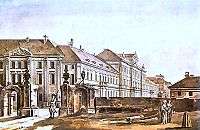Collegium Invisibile


Collegium Invisibile is an academic society in Poland, founded in 1995, that affiliates outstanding Polish students in humanities with distinguished scholars in accordance with the idea of liberal education.[1] The association aims at offering young scholars the opportunity to participate in original research projects as well as exclusive individual master-student cooperation through the tutorial system based on methods used in the Oxbridge universities.[2]
Collegium has its roots in the tradition of the 18th century Collegium Nobilium, an elite high-school founded in 1740, one of the predecessors of Warsaw University. Traditionally, the Rector of the University is ex officio the Chairman of the Science Board of the Collegium.[1][3]
Each year about twenty Polish students who have succeeded in passing a stringent admission procedure are granted membership of Collegium and thus receive an opportunity to follow an individually chosen path of academic study.[4][1]
Tutors
Students choose scholars with whom they would like cooperate. The scholars are then invited to become fellows of the Collegium.[4]
The list of fellows[5] includes names such as Leszek Balcerowicz and Hanna Gronkiewicz-Waltz (former Finance Ministers) in the field of economics, Bronisław Geremek and Andrzej Olechowski (former Ministers of Foreign Affairs) in the field of European studies, as well as eminent philologists, philosophers and lawyers (e.g. Aleksander Gieysztor, Jan Błoński, Jerzy Kłoczowski, Monika Kostera, Andrzej Koźmiński, Ryszard Legutko, Philippe Lejeune, Zbigniew Pełczyński OBE, Wojciech Roszkowski, Marek Safjan, Marek Siemek, Paweł Śpiewak, Józef Tischner).
References
- 1 2 3 Anna Maria Kola (2010). "Rola kształcenia elitarnego w procesie demokratyzacji i pluralizacji społeczeństwa polskiego po 1989 roku (The Role of élite training in the process of democratization ald pluralization of Polish society after 1989)" (pdf) (in Polish). Nicolaus Copernicus University in Toruń. pp. 18–20. Retrieved 25 April 2011.
- ↑ Mariusz Drozdowski (25 March 2008). "Elitarnie, niewidzialnie (Exclusively, invisibly)" (in Polish). onet.pl. Retrieved 25 April 2011.
- ↑ "Historia (History)" (in Polish). ci.edu.pl. Retrieved 25 April 2011.
- 1 2 "Collegium Invisibile czeka na studentów (Collegium Invisibile is recruiting)" (in Polish). gazeta.pl. 14 March 2006. Retrieved 25 April 2011.
- ↑ Full list of former and present tutors: "Tutorzy (Tutors)". ci.edu.pl. Retrieved 25 April 2011.